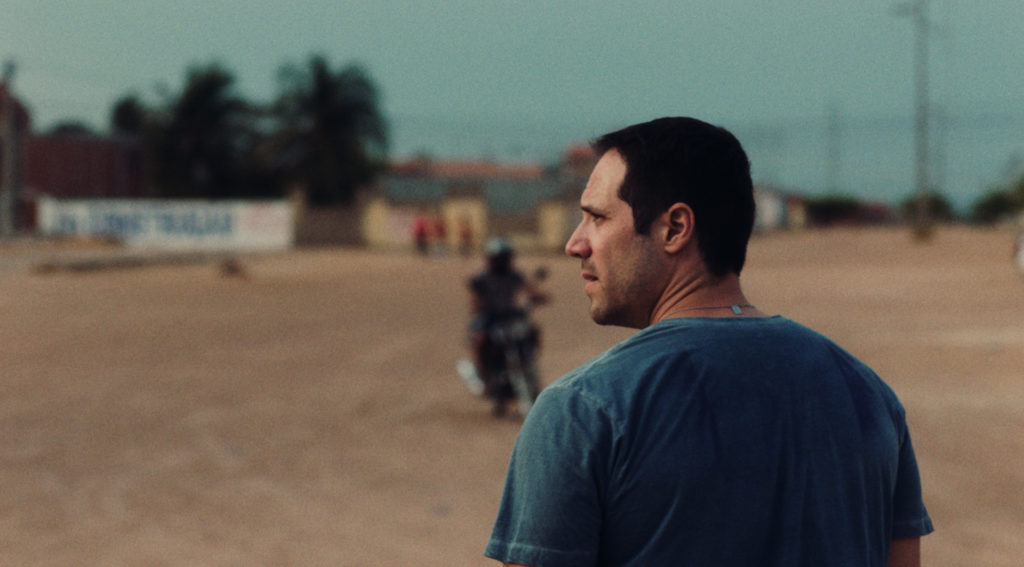
Masculinity in crisis with repressed sexuality has been depicted in numerous forms and levels, especially the lone policeman with a dubious past who struggles with his identity. But the Brazilian drama “Private Desert” gets an unusual virtual touch when a nuanced transgender character is the center of an unexpected queer love story trapped under patriarchy. The winner of the audience award at Venice Film Festival is painfully intimate in a charged era.
Falling in love without having met can stir things up. Daniel (Antonio Saboia, “Bacurau”) is a handsome, rugged, macho man in Curitiba with a plastered hand and a longing heart. He is a police officer suspended for assaulting a new recruit – news that reached the whole country. He is seemingly a straight man, rather one-dimensional and difficult to grasp, as he lovingly takes care of his silent, sick military father, running at night wearing a leather jacket or arguing with his sister. His real comfort is Sara whom he has never met in person – she lives on the other side of the country and is the only person who makes him smile. Something clicked in cyber space. Two lonely souls in two different worlds.
“Private Desert” is a film of contrasts. Contrasts in landscapes, protagonists and atmosphere, skillfully carved like two different movies in one, just as Brazil is two different countries geographically, historically, culturally and socially – with an enormous gap between the rich and the poor. The director Aly Muritiba (“Rust”, “To My Beloved”), who was born in the north, in Bahia, but lives in the south and worked as a prison guard for many years, has set the first half hour in Daniel’s hometown of Curitiba in the south. Daniel’s world is rather cold, grey and lonesome, his father and sister seem to be his only company.

His contact with Sara gives him a meaning, but when she suddenly stops answering his messages he gets frustrated and anxious. It becomes the trigger to a much-needed change – he crosses the country to find her. She lives in Sobradinho in the state of Bahia, a small town two thousand miles away in the rural Northeast of the country –the opposite of the largely European-descended and more urban South. In Sobradinho everything is different: people’s behavior, the weather, the colors.
When the film starts to focus on life in Bahia, the contrast becomes more apparent. The cinematographer Luis Armando Arteaga embraces it with beautifully lush images. After beginning with static camera shots, the film opens up and starts to vibrate, accompanied by a haunting original score by Felipe Ayres, while Bonnie Tyler’s “The Eclipse of the Heart” is later used to electrify a key scene. Sara is a young gender fluid blue-collar worker who lives as her male birth identity Robson by day with her church-loving grandmother. In this small community she juggles the double life and longs to escape. One of the strengths of the film is Pedro Fasanaro’s astonishing performance as he captures the complexity of this strong, sensitive and moving character. We feel her internal struggle in a place where the church wants to convert her and potential threats lurk behind corners. It is clear why she run away from Daniel, afraid to be herself as she both wants him but is too terrified to reveal the truth. Her presence also changes our way of looking at Daniel. Without the traps of overdramatizing, Aly Muritiba and the co-writer Henrique Dos Santos realistically balance the duality, while highlighting bigotry and discrimination.

In Bahia the film also takes off. The script gets stronger, although some dialogue could have been more nuanced. The sensuality starts to glow – Sara’s personality and desires are ambivalent and unpredictable. Her courage is infectious, her shyness human and distinguishable, but life as a trans person is fragile in a conservative world. The film is in contrast to what the leader of Brazil represents, a country that is torn between opposites.
A crucial part of the film depicts how the Internet changes lives, offering a viewpoint on how virtual connections open up opposite worlds, how surprising encounters and love affairs are now possible. This tool that is used and gets presidents elected by spreading alternative information that otherwise wouldn’t have found platforms. The Internet may also be synonymous with loneliness – interaction as an illusion of being close and create misleading visions of others.
But the interaction between the characters in “Private Desert” makes them wiser – Daniel’s toughness and Sara’s tenderness is a cinematic fit. The film shows a poignant pathos for them and their unexpected love affair without putting labels on anyone, a real understanding of the enigmatic law of desire and love. There are expectations of the male way of being and loving in a patriarchic society. But that way is changeable for some.
Grade B+
Check out more of Niclas’ articles.
Here’s the trailer of the film.

